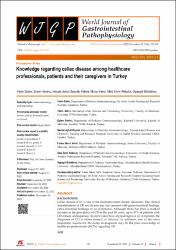Knowledge regarding celiac disease among healthcare professionals, patients and their caregivers in Turkey

Göster/
Erişim
info:eu-repo/semantics/openAccessTarih
2022Yazar
Sahin, YasinSevinç, Eylem
Bayrak, Nevzat Aykut
Varol, Fatma İlknur
Akbulut, Ulas Emre
Bükülmez, Ayşegül
Üst veri
Tüm öğe kaydını gösterKünye
Sahin, Y., Sevinc, E., Bayrak, N. A., Varol, F. I., Akbulut, U. E., & Bükülmez, A. (2022). Knowledge regarding celiac disease among healthcare professionals, patients and their caregivers in Turkey. World Journal of Gastrointestinal Pathophysiology, 13(6), 178.Özet
Background: Celiac disease (CD) is one of the most prevalent chronic disorders. The clinical manifestations of CD are diverse and may present with gastrointestinal findings, extra-intestinal findings or no symptoms. Although there has been a marked increase in the prevalence of CD in the past 30 years, up to 95% of patients with CD remain undiagnosed. As most cases have atypical signs or no symptoms, the diagnosis of CD is either missed or delayed. In addition, one of the most important reasons for the delay in diagnosis may be the poor knowledge of healthcare professionals (HCPs) regarding CD.
Aim: To evaluate the knowledge of HCPs, patients and their caregivers (parents) regarding CD.
Methods: The current study was carried out between June 2021 and February 2022 prospectively, as part of the Focus IN CD project. Patients with CD and their caregivers participated in the study from 6 different cities in Turkey. General practitioners, pediatricians, pediatricians with other subspecialities and pediatric gastroenterologists from different cities participated in the study.
Results: The questionnaire was completed by 348 HCPs, 34 patients with CD, and 102 mothers and 34 fathers of patients with CD. Most of the participants were general practitioners (37.07%). There were 89 (25.57%) pediatricians and 72 (20.69%) pediatric gastroenterologists in the study. The highest score in all categories was achieved by pediatric gastroenterologists. There were significant differences between the four groups of HCPs in terms of the subsections of overall mean score, epidemiology and clinical presentation, treatment and follow-up. No significant difference was found between the groups (patients with CD, mothers of patients with CD and fathers of patients with CD) in terms of the questionnaire subsections.
Conclusion: The level of knowledge on CD among HCPs, patients and their caregivers was unsatisfactory. We consider that it is necessary to increase awareness and to develop e-learning activities on CD among HCPs, patients and their caregivers. Consequently, they may benefit from e-learning programs similar to the one created as part of the EU-funded project Focus IN CD (https://www.celiacfacts.eu/focusincd-en).















